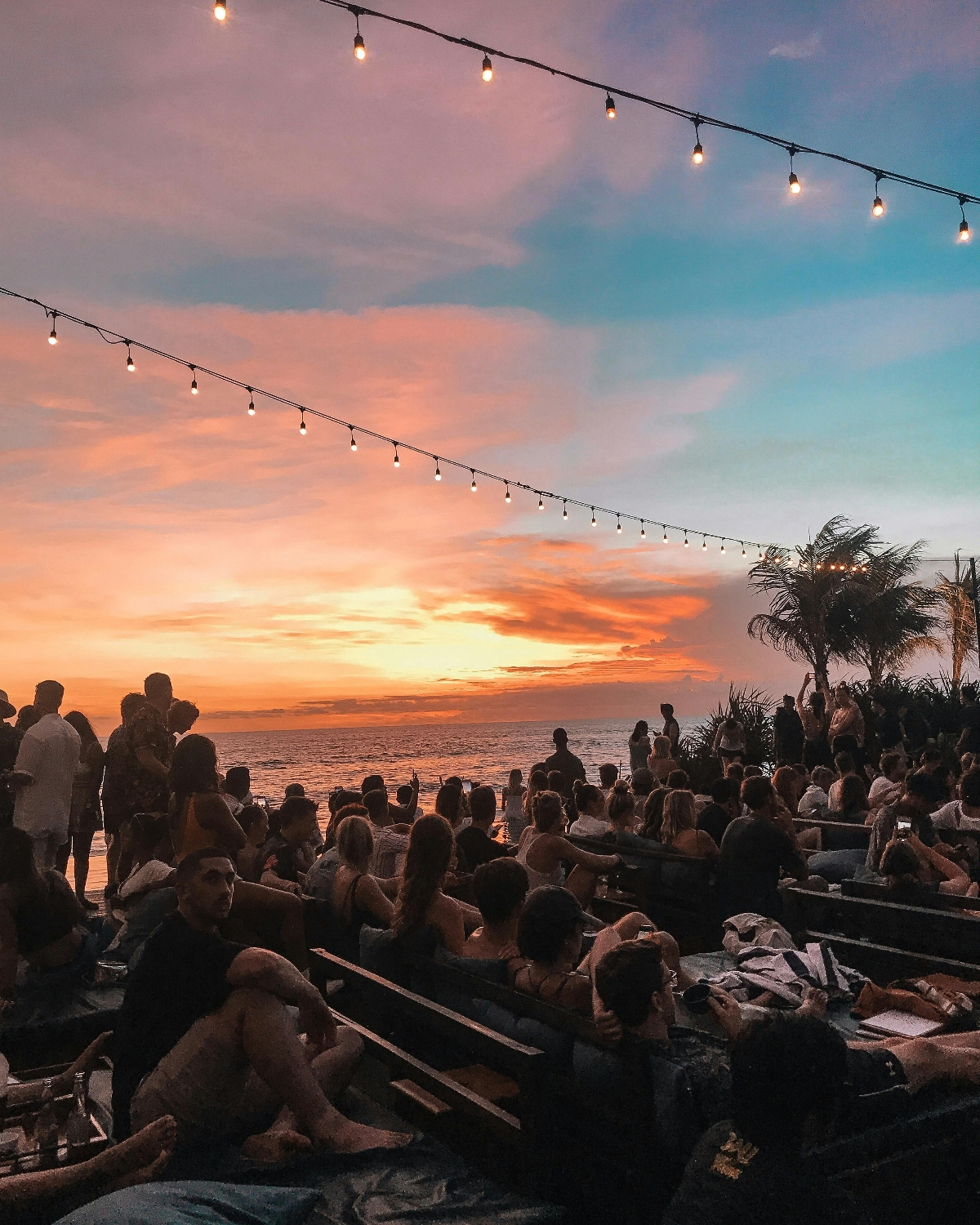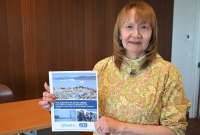Support strong Canadian climate journalism for 2025
Nestled in the mist-shrouded mountains of northern Bali, organic coffee farmer Putu Ardana is leading the charge to revive traditional farming and protect sacred lands from mass development and tourism.
Ardana, 67, grows, harvests and roasts Arabica beans without chemicals and fertilizers in his village of Munduk, perched 800 metres above sea level. He uses water from nearby Tamblingan Lake — which is sacred to him and other members of the Indigenous Dalem Tamblingan people who first settled around local lakes and forests in the 9th century.
The island province of Bali also lies at the heart of Indonesian tourism. The popular destination accounts for half of the country’s $20-billion annual tourism revenue and the bulk of its tens of millions of visitors. Eighty per cent of the Balinese economy depends on tourism.
But Ardana believes "tourism should be a side-effect … not our main goal and our way of life.”
Bali’s mass tourism, concentrated in its southern towns, long ago “reached a tipping point,” says Stroma Cole, a University of Westminster lecturer who researches tourism and water in Bali. Over 65 per cent of Bali’s fresh water is funnelled to tourism, which is contributing to a water shortage exacerbated by growing urbanization, recent droughts and climate change. Half the province’s 400 rivers have dried up and experts warn Bali could run out of water in a few years. Local Balinese bear the biggest burden of the water crisis that has jeopardized food security and threatened cultural sites and traditional practices.
In 2017, the Indonesian government designated Munduk as an eco-focused "tourism village," along with six others. But in the aftermath of the COVID-19 pandemic, Jakarta laid out an even more ambitious tourism plan that prioritized attracting millions more tourists and transforming rural villages and ecologically sensitive areas into tourist hot spots like Bali. The government says it will focus on sustainable and inclusive tourism that will prioritize locals and protect the environment. Among the designated tourism locales is Munduk, which highlights the challenges of balancing economic growth and any real, sustained benefits for people and the environment.
Crown jewel and a water crisis
Bali, dotted with lush jungles and white sand beaches, is known as the "crown jewel" of Indonesian tourism. It consistently ranks among the top travel destinations in the world. In 2019, out of the 16 million international tourists who visited Indonesia, six million landed in Bali. Last year, nearly half of the 11.7 million foreign arrivals to the country went to Bali. This year, the island province aims to attract seven million visitors.
Bali’s mass tourism industry has brought economic development. It has grown its GDP tenfold and employs at least one-quarter of the Balinese workforce. It has also helped cultivate a water shortage alongside growing wealth and quality-of-life disparities.
Balinese tourism relies heavily on foreign investors and local elites who have razed farmland, displaced residents and tapped dwindling groundwater supplies to build water-guzzling luxury villas and resorts. Bali’s tourism-related water demand surged 295 per cent from 1988 to 2013, with the average tourist consuming three times more water than local residents. The province loses roughly 1,850 acres of farmland to tourism annually.
“The island’s tourism continues to boom — but for whom? Bali’s water crisis is so much more than a water shortage. It’s a catastrophe that affects local people’s quality of life, livelihoods and traditional Balinese culture,” says Jaeyeon Choe, a Bournemouth University researcher who studies sustainable tourism and community development in Bali.
Bali’s freshwater aquifers have now dipped to a record low of 20 per cent as water is diverted from rural areas and agriculture to support tourism development, according to research from IDEP Foundation, an Indonesian NGO, and University Politeknik Negeri Bali.
“What scares us … is that we may not have clean water in two, three, or five years,” says Fransiskus Edward Angimony, an IDEP researcher who works with the foundation’s Bali Water Protection program.

Sustainable tourism in the ‘village above the clouds’
Known as the "village above the clouds" with spring-fed waterfalls, Munduk is a critical freshwater source for Bali. Its mountain lakes contribute 35 per cent of the province’s water supply. But the town of 6,000 is also intertwined with Indonesia’s plan to develop “high-quality sustainable tourism” that will attract 40 million visitors by 2025.
Deforestation from illegal logging and land conversion for monoculture crops, like hydrangea flowers, alongside development for tourism purposes, have depleted Munduk’s lakes in recent years. “When I was a child growing up in the 1970s, I saw that our lake waters were still full. Now we have less and less water every year,” says Made Sawika, a Munduk local and the village’s head of tourism. Some locals worry the push toward tourism will repeat south Bali’s mistakes by intensifying water shortages, entrenching inequalities and eroding cultural practices.
Munduk’s land prices and taxes have soared since being tapped as a tourism village, with only a minority of residents benefiting from the changes. “It has brought money to few but is destroying our land and water resources and unique Balinese civilization,” Ardana says.
Residents of Munduk — and other Balinese villages — frequently square off against tourism developers over concerns of water loss and encroachment on ecologically and culturally sensitive sites. “We glorify our water, our forests, and our land. It is our source of life and should be protected,” says 19-year-old Munduk local Diandra Orissa, an Indigenous youth leader who spoke at the COP28 summit in Dubai last year.
Foreign and local investors, in recent years, have obtained state-sanctioned permits to develop tourism sites in Alas Mertajati, the forest area that covers Lake Tamblingan. In 2021, an Indigenous youth-led movement in Munduk stopped one such development over concerns it would destroy native flora and fauna.
“But there are always new [tourism developments] popping up. So much land in Bali has been bought for the purposes of tourism — even when locals have rejected the idea. It shouldn’t be happening in ecologically sensitive areas and especially against the will of the people,” Cole says.
Munduk’s eco-tourism mandate and ecological status means that fish farming and water-based tourism remain forbidden at Lake Tamblingan. Businesses like hotels require special permits for construction. Munduk’s hotels all market themselves as eco-resorts.
Puri Lumbung, a locally owned resort where musician David Bowie once stayed, relies on traditional Balinese architecture rather than air conditioning to cool its 20 villas. The property draws water from designated aquifers and carefully monitors water use. Munduk Moding Plantation, a luxury eco-resort, filters wastewater through gardens, which allows it to reuse the water on its grounds.
Despite these efforts and hotels’ reduction of water usage, “the reality is … if you have more tourists, you need more hotel rooms and you’re using more water,” leaving less for residents, Cole says. “We know that there will be less water in Munduk if we have more hotels,” Sawika says.
Meanwhile, some developers and tourism operators game the system. “Hotels could have six or seven wells where they get water from, but only report two of them to minimize their taxes," says one local business owner who declined to be named.
Local participation and buy-in remain key to Munduk’s water conservation efforts. Munduk locals recently teamed up with the Bali Water Foundation to develop a prototype for water-recharge wells for harvesting rainwater. But even if the project is successful, “the 40-year water cycle means that we can … only see the benefits in 40 years,” Angimony says.
At the same time, community leaders like Ardana have led the charge to protect the village’s land and water sources through advocacy and a return to organic farming: “It offers an alternative income avenue to tourism that also brings awareness of our precious resources and farming heritage,” he says. Community leaders like Ardana have led the charge to return to organic farming — an alternative to tourism that provides an income avenue for locals, “awareness of land and our farming heritage,” he says.
***
The government is now focusing on its five "Super Priority Zones" of tourism — in ecologically and culturally sensitive areas — that it hopes will become the country’s new Balis. But this plan only “provides an illusion of prosperity while hiding the deeper problem,” Angimony says.
“The government wants to make people believe that Bali … is the [growth] model we should follow. But Bali is not OK. There are so many problems from the mass tourism we created in Bali. We’re not rejecting tourism, but we need a better model.”
This story was reported with support from the Asia Pacific Foundation of Canada.






Comments